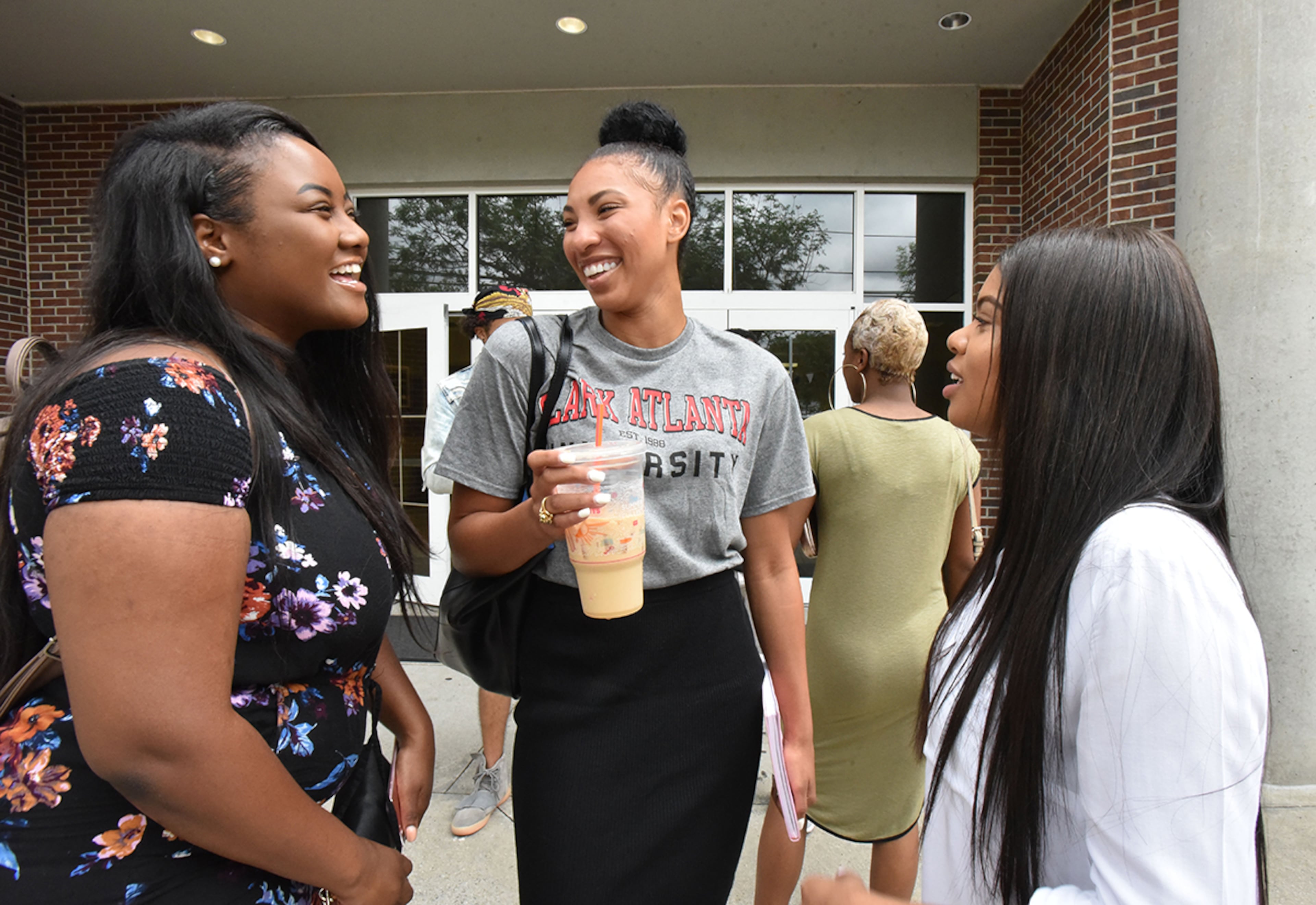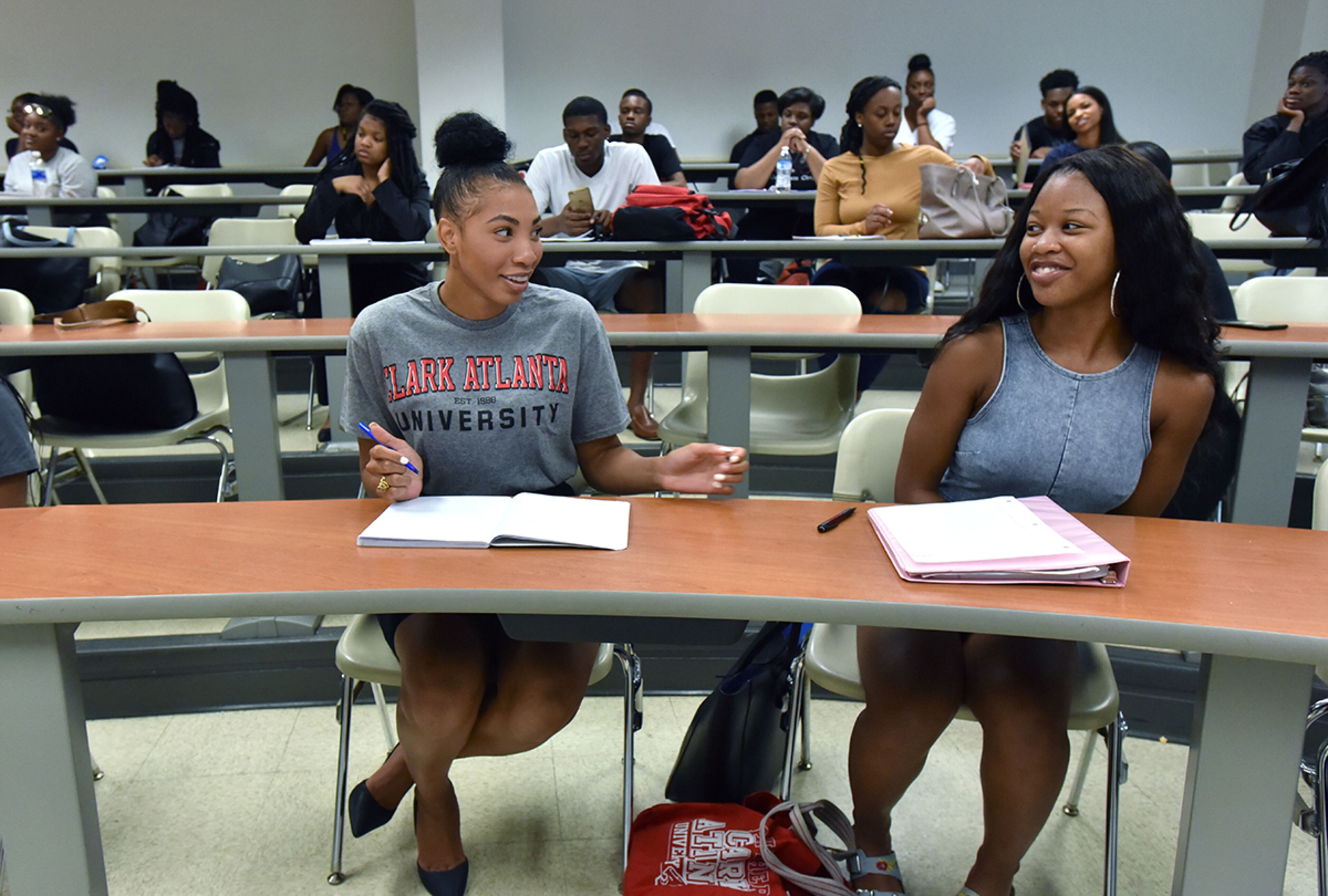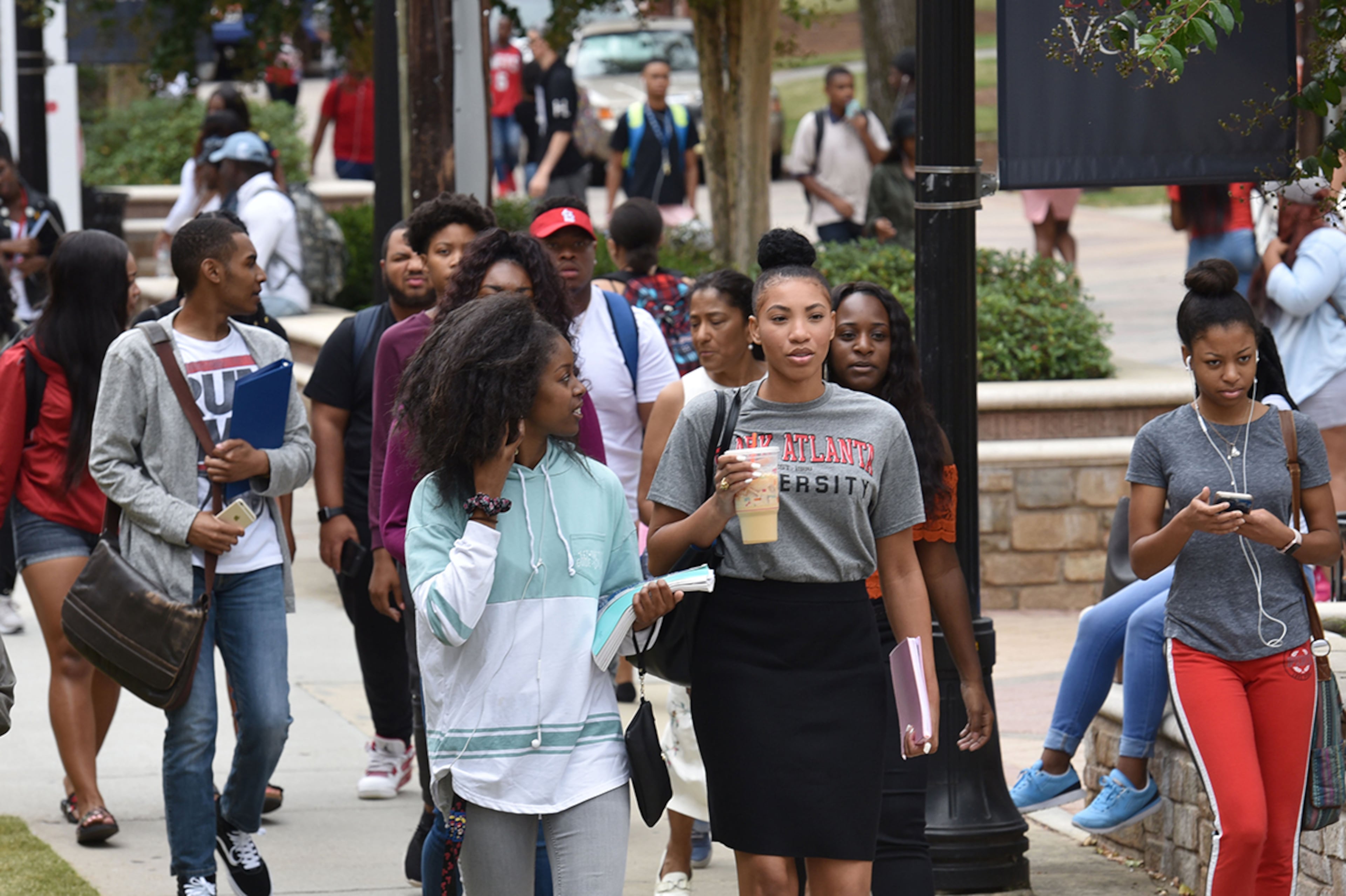HBCU student finds a dream reborn by transferring to Clark Atlanta
NOTE: Kendall Youngblood and Delanie Mason made different choices when it came to deciding whether to attend an HBCU. This is one of two articles that profile the women and explain their decisions. Read Delanie's story here.
Camille Youngblood has seen significant changes in her younger sister, Kendall, in the past two years.
Kendall, 22, often seemed frustrated in the beginning of that period. The conversations between the sisters, attending different colleges, were sometimes strained, Camille said.
» GO DEEPER: Perilous times for black colleges
» FULL COVERAGE: The entire "HBCUs: A Threatened Heritage" series
In her private high school class of 107 students, Kendall was one of six African-American students and wanted to continue her education at a school where she could explore her racial identity. She considered attending one of the nation’s historically black college and universities (HBCUs).
The heavily recruited field hockey athlete enrolled instead at the University of Connecticut in 2015, following a route that others had set for her. But her experience there was wanting. Kendall’s family wondered whether she needed a change to another school.
Kendall Arianna Youngblood grew up in Milwaukee in a family that took extra steps to help her succeed. Her parents were athletes at Division I schools. Kendall, who traveled to other states and abroad to play field hockey, was recruited by major players, including the University of Michigan and the University of Virginia.
Those big state schools with well-known names seemed to offer success academically and financially. Her guidance counselors steered her toward large, predominantly white institutions, known as PWIs. Many of those schools offered athletic scholarships, while HBCUs don’t have women’s field hockey programs.
“I was trying to obtain this dream that everybody had for me: ‘You need to go to a PWI. You need to go to a (Division I) college to be important in the world,’” she said.
Kendall had a plan upon arrival at UConn. The headquarters of ESPN, the famed sports network, is nearby, so she majored in communications, though she was also interested in business.
“In my heart, I’ve always been an entrepreneur,” she said.
Dressed one recent afternoon in a dark blue dress and heels and carrying a beige and brown Michael Kors purse, she looks like a young CEO.
But at UConn, Kendall often felt noticed by professors or classmates because she was one of the few black students in a class. She couldn’t get involved in African-American activities because of her athletic commitments, which Kendall described as a “job.” It bothered her.
“It was the same thing I experienced at private schools (growing up), but on a larger scale,” she said.
‘Let me know where you’re flying to’
Kendall completed the fall 2015 semester at UConn but felt something foreboding about her future there. Shortly thereafter, she learned her mother, the woman Kendall describes as “Supermom,” needed surgery. Kendall said she could no longer afford the tuition, even with the athletic scholarship. She dropped out and temporarily lived with Camille in New York City and then with her father in California.
The break gave Kendall time to think about the future: What kind of education do I want? What do I want for myself?

A friend suggested she check out Hampton University, an HBCU in Virginia. Kendall was pleasantly surprised by the lower tuition.
She researched HBCUs on the East Coast, watched YouTube videos and talked to some students. She also looked at some more affordable PWIs.
Kendall and her mother visited Clark Atlanta University and Spelman College in Atlanta during the spring of 2016. She expected CAU to look old and traditional. The red brick exteriors of its dorms and lecture halls did, indeed, look traditional. The interiors, though, looked new. CAU also had a business program.
She was sold. Her sister was not.
“I was very against it,” said Camille, 24, a first-year Harvard Law School student.
Kendall is swimming against a tide. Most black colleges have experienced declines in financial support and enrollment. U.S. Department of Education numbers say that in 2015 there were 292,710 students in the nation’s 101 accredited HBCUs. That is down 11 percent since 2010.
Camille worried her sister would have trouble fitting in after an academic lifetime of being in classes with few black teachers. She sent her articles about other schools. Camille was being protective, but their father convinced Camille to let Kendall make her own decision.
Kendall told her mother it was time for her to spread her wings.
“I said, ‘Just let me know where you’re flying to,’” Synovia Moss said.
‘That’s where the tears came in’
Kendall transferred in 2016 to Clark Atlanta University, an HBCU near downtown Atlanta.
CAU, the product of the 1988 merger of Clark College and Atlanta University, sits in the shadows of the new Mercedes-Benz Stadium.
It's part of the Atlanta University Center that includes the single-gender HBCUs Morehouse and Spelman colleges. CAU, though, with about 3,660 undergraduate and graduate students, has a larger student body. It is co-ed, but women outnumber men 3-1. One-half of its students are from outside Georgia. CAU, which sometimes feels overshadowed by Spelman and Morehouse, stuck its chest out recently when Grammy-award winner Chance the Rapper tweeted that he wants to enroll there.
At first, most of Kendall’s friends were also transfer students. She got more involved in extracurricular activities, and her network grew. Kendall said the activities forced her from her comfort zone. Before, she easily quit jobs and other activities. Here, classmates, faculty and mentors refuse to let her quit anything.
The adjustment wasn’t easy.

“That’s where the tears came in,” she said. “There was a lot of prayer, asking God to help me be the person I want to be.”
Elisha Harris, president of CAUs student government association, encouraged Kendall to get involved in the association. He saw someone who was organized and had a strong work ethic. She’s now an SGA intern, helping organize meetings and events.
The exposure and involvement in different activities has raised her awareness of national politics, race relations and education. In addition to dreams of becoming a Realtor, she wants to get involved in community activism.
‘Everything started blooming’
On a recent afternoon, Kendall proudly gave her sister a tour of her campus, “the illustrious” Clark Atlanta University, happily introducing Camille to friends and faculty.
Kendall, a junior, has a 3.5 grade point average, which was higher than at UConn, has built strong friendships with classmates and says she has a closer relationship with her family.
As the enrollment of the nation’s HBCUs ebbs, CAU officials are eager to show students like Kendall how HBCUs help develop African-American students into successful college graduates.
“At HBCUs, you have to put yourself out there,” said Kendall, who said she previously wasn’t comfortable with doing so. “When you put yourself out there, it’s a different experience. You have more fun. You get a sense of being proud of the school you are at.”
Kendall speaks with exuberance about her school and frequently recites CAUs slogan: “I’ll find a way or make one.”

The new Kendall, her sister said, contacts her more frequently and sounds at ease when they talk. Kendall, once the gym rat, is a library fanatic.
Kendall believes that transferring to CAU has made her more resourceful, increased her community awareness and given her greater control over her life and choices. She compared her personal growth to a seed being planted.
“Once I came here, everything started blooming and blossoming,” Kendall said.
Her mother used similar language.
“I think she is blossoming into the fullest of what she dreams for herself,” she said.
‘It’s like the coolest thing to me’
Kendall believes she made the right decision and dismisses perceptions that HBCUs aren’t as academically rigorous.
Camille has learned from her younger sister and others about the benefits of HBCUs. She says graduates have greater self-awareness.
“If my kids want to go to a HBCU, I wouldn’t knock it at all,” she said. “I wouldn’t have said that two years ago.”
Kendall has no animosity toward UConn. It taught her introspection. It just wasn’t the place that was going to help her figure out “who am I?” UConn is focused on how to help students become successful, Kendall said. At CAU, she said the goal is to teach students how to persevere.
Her mother agrees Kendall is getting pushed in ways that come from her attending a HBCU. Kendall is more resilient. She’ll often call mom to talk about classroom discussions with her professors.
“I know what she is getting there, she wouldn’t get anywhere else,” Moss said.
Camille said, “To see her figure who she wants to be, it’s like the coolest thing to me.”
“And she’s happy.”



